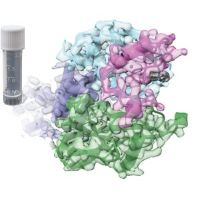Specification
| Description | Recombinant protein from the full-length sequence of homo sapiens tumor protein p63 (TP63), transcript variant 1 (NM_003722). |
| Organism | Homo sapiens (Human) |
| Expression Host | Human Cells |
| Tag Info | His or DYKDDDDK. Please contact us if you need further information or require specific designed tag. |
| Purity | Greater than 90% by SDS-PAGE gel |
| Uniprot ID | Q9H3D4 |
| Entry Name | P63_HUMAN |
| Gene Names | TP63 KET P63 P73H P73L TP73L |
| Alternative Gene Names | KET P63 P73H P73L TP73L |
| Alternative Protein Names | Tumor protein 63 (p63) (Chronic ulcerative stomatitis protein) (CUSP) (Keratinocyte transcription factor KET) (Transformation-related protein 63) (TP63) (Tumor protein p73-like) (p73L) (p40) (p51) |
| Application | Antigens, Western, ELISA and other in vitro binding or in vivo functional assays, and protein-protein interaction studies; For research & development use only! |
| Buffer | Purified protein formulated in a sterile solution of PBS buffer, pH7.2, without any preservatives |
| Endotoxin | Endotoxin level is < 0.1 ng/µg of protein (<1EU /µg) |
| Length | 680 |
| Molecular Weight(Da) | 76785 |
| Protein Sequence | (The sequence of expressed protein may have some variation from the sequence shown below. Please contact us for the exact sequence.) MNFETSRCATLQYCPDPYIQRFVETPAHFSWKESYYRSTMSQSTQTNEFLSPEVFQHIWDFLEQPICSVQPIDLNFVDEPSEDGATNKIEISMDCIRMQDSDLSDPMWPQYTNLGLLNSMDQQIQNGSSSTSPYNTDHAQNSVTAPSPYAQPSSTFDALSPSPAIPSNTDYPGPHSFDVSFQQSSTAKSATWTYSTELKKLYCQIAKTCPIQIKVMTPPPQGAVIRAMPVYKKAEHVTEVVKRCPNHELSREFNEGQIAPPSHLIRVEGNSHAQYVEDPITGRQSVLVPYEPPQVGTEFTTVLYNFMCNSSCVGGMNRRPILIIVTLETRDGQVLGRRCFEARICACPGRDRKADEDSIRKQQVSDSTKNGDGTKRPFRQNTHGIQMTSIKKRRSPDDELLYLPVRGRETYEMLLKIKESLELMQYLPQHTIETYRQQQQQQHQHLLQKQTSIQSPSSYGNSSPPLNKMNSMNKLPSVSQLINPQQRNALTPTTIPDGMGANIPMMGTHMPMAGDMNGLSPTQALPPPLSMPSTSHCTPPPPYPTDCSIVSFLARLGCSSCLDYFTTQGLTTIYQIEHYSMDDLASLKIPEQFRHAIWKGILDHRQLHEFSSPSHLLRTPSSASTVSVGSSETRGERVIDAVRFTLRQTISFPPRDEWNDFNFDMDARRNKQQRIKEEGE |
Background
| Function | FUNCTION: Acts as a sequence specific DNA binding transcriptional activator or repressor. The isoforms contain a varying set of transactivation and auto-regulating transactivation inhibiting domains thus showing an isoform specific activity. Isoform 2 activates RIPK4 transcription. May be required in conjunction with TP73/p73 for initiation of p53/TP53 dependent apoptosis in response to genotoxic insults and the presence of activated oncogenes. Involved in Notch signaling by probably inducing JAG1 and JAG2. Plays a role in the regulation of epithelial morphogenesis. The ratio of DeltaN-type and TA*-type isoforms may govern the maintenance of epithelial stem cell compartments and regulate the initiation of epithelial stratification from the undifferentiated embryonal ectoderm. Required for limb formation from the apical ectodermal ridge. Activates transcription of the p21 promoter. {ECO:0000269|PubMed:11641404, ECO:0000269|PubMed:12374749, ECO:0000269|PubMed:12446779, ECO:0000269|PubMed:12446784, ECO:0000269|PubMed:20123734, ECO:0000269|PubMed:22197488, ECO:0000269|PubMed:9774969}. |
| Pathway | |
| Protein Families | P53 family |
| Tissue Specificity | Widely expressed, notably in heart, kidney, placenta, prostate, skeletal muscle, testis and thymus, although the precise isoform varies according to tissue type. Progenitor cell layers of skin, breast, eye and prostate express high levels of DeltaN-type isoforms. Isoform 10 is predominantly expressed in skin squamous cell carcinomas, but not in normal skin tissues. {ECO:0000269|PubMed:11248048, ECO:0000269|PubMed:9774969}. |
QC Data
| Note | Please contact us for QC Data |
| Product Image (Reference Only) |  |

